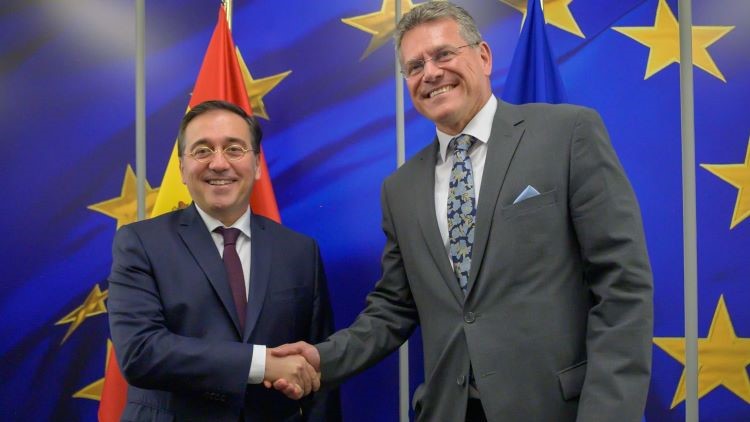Eduardo González
The second meeting between the Minister of Foreign Affairs, José Manuel Albares; the United Kingdom Foreign Minister, David Cameron, and the Executive Vice President of the European Commission, Maroš Šefčovič, held today in Brussels to discuss the future of Gibraltar, has concluded without any concrete announcement and with the aim of “staying in touch narrow and constant.”
According to the joint statement adopted at the end of the meeting, in which the Chief Minister of Gibraltar, Fabian Picardo, also participated as a member of the British delegation, the debates took place “in a constructive atmosphere, with important progress and new areas of agreement.”
“All parties reaffirm that the agreement is closer and that they will work together and quickly on the most relevant aspects to achieve a global EU-United Kingdom agreement,” the text continues.
“The meeting has reaffirmed the shared commitment to conclude an EU-UK Agreement that will bring confidence, legal certainty and stability to the lives and quality of life of people across the region by protecting and improving trade, economic, mobility, the environment and social well-being, while safeguarding the legal positions of each of the parties,” the statement adds. Furthermore, “they have agreed to remain in close and permanent contact,” the text concludes.
Albares: “there is no possible deadline”
In statements to the press at the end of the meeting, Albares assured that it had been a “positive and constructive meeting” in which “important progress has been achieved” based on “the political lines already agreed on April 12, which referred to to mobility, to goods and to the airport.”
“We have made progress to provide legal certainty, also promote the objectives that we set in the Treaty regarding trade, the economy, mobility, social well-being and the environment,” all of this, “of course, safeguarding the legal position of sovereignty of Spain,” he continued.
Regarding the obstacles to reaching an agreement, the minister explained that the three parties had agreed to “maintain the same working method until an agreement is definitively reached and all points are closed” and, therefore, “not to go into excessive detail.” , precisely to protect what has already been agreed and continue advancing in those aspects that still need more technical development.”
In any case, he assured, “we have all expressed our resounding commitment to the final objective, which is to reach this agreement for an area of shared prosperity with Gibraltar and the Campo de Gibraltar and create a new relationship based on trust and prosperity.” “Today is not a point and apart, it is a point followed,” because, starting “tomorrow,” the technical teams will continue working on “some aspects that we have agreed on,” he assured.
According to Albares, the perspective is that “there is an agreement,” but “there is no possible deadline.” “On April 12, important agreements were made and today new agreements have been made, which we hope to conclude soon,” but, “in any case, there is no issue in which either party” has shown “rejection of frontal opposition to reach an agreement,” he added.
For its part, the United Kingdom Embassy in Madrid has limited itself to disseminating the joint statement and has clarified that it will not “make any further statements on this matter.”
The Fence, Schengen and the airport
This is the second meeting within this format, after the one held on April 12 and which concluded with a joint statement in which the three parties limited themselves to announcing that the negotiations had been “held in a constructive atmosphere” and significant progress had been made.” “General political lines have been agreed upon, including on the airport, goods and mobility,” that text continued. “Negotiations will continue over the coming weeks to conclude the EU-UK Agreement,” he added.
The meeting on April 12 allowed talks to be resumed after two and a half years of technical negotiations without any concrete progress. Since the start of the talks, two of the main points of discussion are the removal of the Fence and the de facto entry of Gibraltar into Schengen. This second step would force border controls to be moved to the port and airport. The United Kingdom is opposed to Spanish agents carrying out these controls, and, therefore, it has been proposed as an alternative that the task falls to the European Border Agency (Frontex) for a transitional period of four years.
Furthermore, another point of conflict is related to the use of the Gibraltar airport, which is located on the isthmus that connects the Rock with the rest of the peninsula, a territory whose sovereignty is disputed by Spain and the United Kingdom. The Spanish Government has requested shared use of the airport to benefit the entire region, but the United Kingdom rejects this proposal, considering that it calls into question its position regarding sovereignty.







